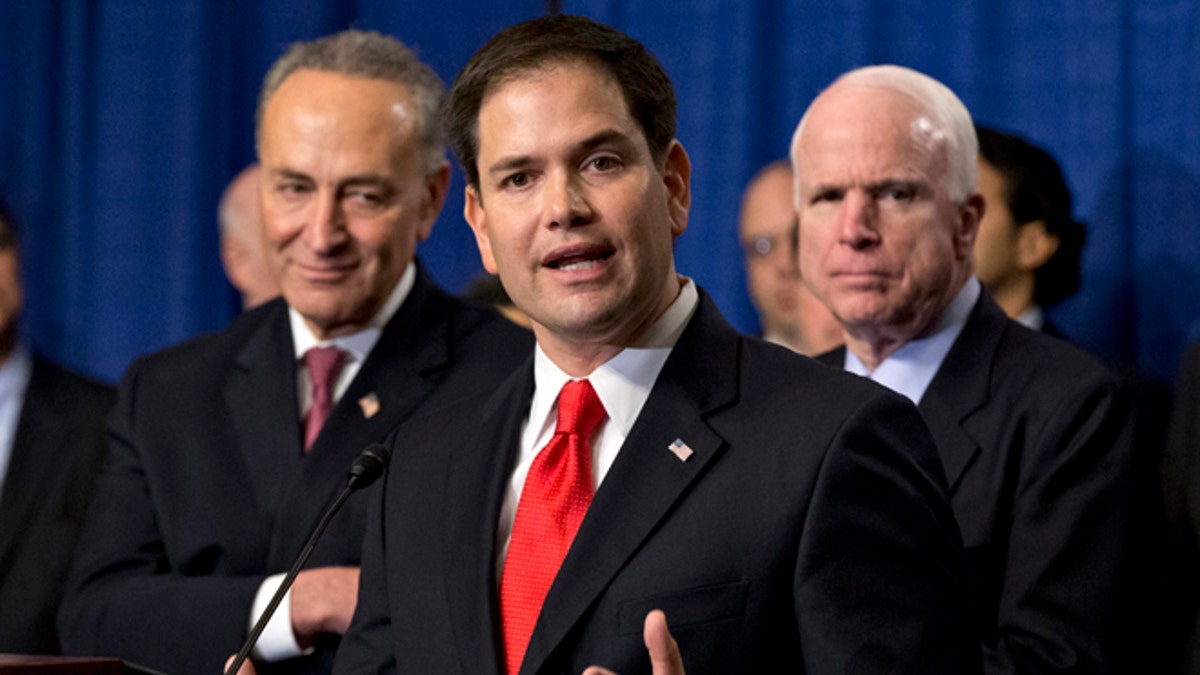
April 18, 2013: Sen. Marco Rubio, R-Fla., flanked by Sen. Charles Schumer, D-N.Y., left, and Sen. John McCain, R-Ariz., right, speaks about immigration legislation. (AP)
Authors of the newly released Senate immigration bill touted the package Thursday as a "bipartisan breakthrough" in advance of a critical hearing, as opponents began to organize against the bill -- claiming it doesn't do enough to enforce existing immigration law.
Sen. Marco Rubio, R-Fla., who has put his conservative reputation on the line with his involvement in writing the bill, took to the floor late Thursday afternoon to defend it. Though critics have homed in on the bill's pathway to citizenship for illegal immigrants, Rubio said the package would also fix a "broken" legal immigration system so that foreign students trained in America would not be sent back home once they've learned their skills.
"If there wasn't a single illegal immigrant in the United States, we would still have to do immigration reform," Rubio said.
As for the path to citizenship, which would give up to 11 million illegal immigrants a shot at legal status, Rubio said "the alternative is to do nothing" -- which he described as "amnesty."
Rubio and the seven other co-authors, who formally unveiled the legislation at a press conference Thursday, are hoping to avoid the fate of the 2007 immigration bill, which died amid heated criticism from both sides of the aisle. Republicans have bluntly professed an interest in courting Hispanic voters, and some prominent members, including Rubio, have lent their name to the effort.
But critics were building a multi-faceted case against the bill, in advance of Friday's hearing on the Senate Judiciary Committee. They claimed the bill grants "amnesty" without enough enforcement provisions. They claimed it would burden taxpayers by eventually plugging legalized immigrants into the public welfare system -- a claim Rubio has strongly challenged. And Republican critics joined immigration enforcement officers in claiming the bill would not address a major loophole -- giving the government "discretion" to choose when to enforce immigration laws.
"No immigration bill should ever pass Congress that the law enforcement officers on the ground tell us won't work or can't be enforced," Sen. Jeff Sessions, R-Ala., said Thursday.
Sessions was referring to the concerns voiced by the National ICE Union, which represents Immigration and Customs Enforcement agents.
The group has long complained that the Obama administration has made their job harder by preventing agents from detaining and deporting select illegal immigrants. They had petitioned members of the so-called "Gang of Eight" -- the lawmakers writing the immigration bill -- to address those concerns in the package.
But, in a letter obtained by FoxNews.com, National ICE Council President Chris Crane said "this legislation again does nothing to resolve that."
The letter was sent Tuesday to Rubio, shortly before the legislation was formally released. Crane thanked Rubio for meeting with him, but complained that the bill did not address his concerns.
"In fact, it appears that the security components it does contain focus mostly on the exterior, and rely on the discretion of DHS, even though DHS is in federal court right now for undermining the constitutional rule of law," Crane wrote, referring to a lawsuit brought by ICE agents.
The proposal, as emphasized by its co-authors, does aim to invest billions in border security -- both for a security and fencing plan. In a bid to ease conservative concerns, the bill establishes a set of "triggers" that would have to be met before illegal immigrants currently in the country can apply for a green card.
Those triggers include steps for the Department of Homeland Security to launch a new border security and fencing plan, and achieve high levels of apprehension along high-risk areas on the Mexican border.
But Crane said the Senate legislation should be held until several major issues are addressed -- including what he described as "directives" that release "dangerous criminal aliens" back into the community and the Obama administration's "dangerous abuse" of prosecutorial discretion.
The administration has allowed "prosecutorial discretion" to let the government focus on deporting high-risk illegal immigrants. Officials have said criminal aliens are generally not being released, and that only low-priority individuals are given a reprieve. The administration also issued a directive allowing some illegal immigrants who came to the U.S. as children to stay.
Critics, though, warn that legalizing the millions of illegal immigrants already in the country without establishing a strict system of interior enforcement will allow the problem to fester all over again.
While the path to citizenship and other provisions draw the most scrutiny from congressional Republicans, the nearly 900-page bill contains a number of other measures -- including a new system of temporary visas for low-skill workers and expanded visas for high-skill workers.
The bill, unlike the recently stalled gun control legislation, comes out of the gate with prominent bipartisan backing. Rubio was one of four Republicans drafting the bill, and some other Republicans have expressed a willingness to consider an immigration overhaul, with the goal of leveraging the immigrant workforce to help the economy and cutting red tape.




